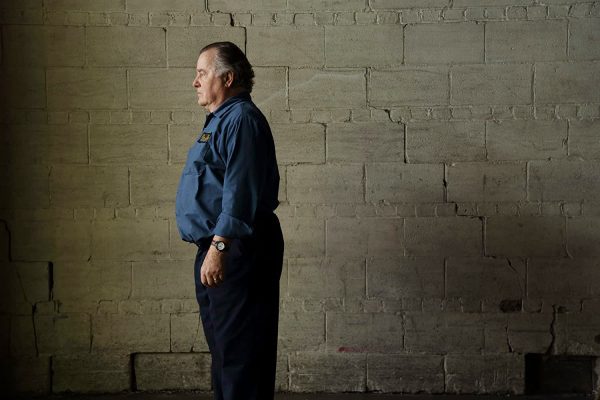Film Review: “Working Man” — Singing the Proletarian Blues
By Jason M. Rubin
Working Man does an excellent job dramatizing the poverty and desperation of people who live paycheck to paycheck.
Working Man, written and directed by Robert Jury. Streaming on video-on-demand.

Peter Gerety in a scene from Working Man.
There’s a saying that if you want to give God a laugh, tell him your plans. This year God must be hysterical, because history will look back on 2020 as the Year of Broken Plans. Everything from weddings to concert tours to movie releases has been subject to cancellation or rescheduling. Case in point: Working Man, the directorial debut of Robert Jury, who also wrote and co-produced the feature, was slated for limited release in March and broader release in May. Suffice to say, it didn’t happen. But this small, endearing, and sadly all too relatable film about what the loss of work can do to working-class people is now available on all video-on-demand platforms. If you’re tired of movies and TV shows with few characters to root for, I recommend giving Working Man a shot.
Featuring a rare but well-deserved lead role for Providence, RI-born, Boston University–educated Peter Gerety (Sneaky Pete, The Wire, Homicide: Life on the Street), the film begins on the last day of work for the small remaining workforce at a factory that makes plastic reflectors (a nod perhaps to the classic one-word line of existential cynicism from The Graduate). As they collect their final paychecks and head home (it’s a factory town where a significant percentage of the population at one time worked in that factory), the newly unemployed workers wonder what they’ll do.
Gerety’s Allery Parkes, however, knows exactly what he’s going to do: He’s going to go back to the factory, in uniform, with a lunch bucket containing a liverwurst sandwich and a powdered donut, and a thermos full of coffee, and keep on working. He manages to find a way into the locked facility and continues to go back day after day, earning the derision of his neighbors and former co-workers, who think he’s crazy.
Parkes is not crazy but he is broken. He and his wife, Iola, played by Talia Shire in an autumn-years reprise of the twitchy and awkward Adrian from Rocky, mourn their son’s death from suicide — yet they mourn separately, not together, and so speak little to each other. Eventually, Parkes’s unintentional protest gains the support of the community, who finally treat him with some respect and even make him their leader. But he’s not trying to buck the corporate interests that closed down the factory — he just has nothing else that gives his life any purpose.
It’s here that Parkes and his protest get a boost in energy and charisma from Walter Brewer, who had been on the job only eight months before getting canned. Played to the hilt by Billy Brown (How to Get Away with Murder, Dexter), Walter begins to play puppet master. But there’s too much that Parkes and Brewer don’t yet know about each other, and that discovery drives the last third of the movie.
In Jury’s hands, the movie is quiet, deliberately paced, and provides few dramatic peaks. But Working Man does an excellent job dramatizing the poverty and desperation of people who live paycheck to paycheck. Simple meals augmented with mixed vegetables, no doubt from a can; simple furniture; simple lives, wanting no more than the simple dignity of being able to do a day’s work for a day’s pay. When a local television reporter asks Parkes what he wants, he gives a simple response Bill Belichick would love: “I just want to do my job.”
There are no great surprises or revelations in this film, just characters you care about and root for. Though its timing was unfortunate in terms of its release in theaters, the film’s focus on unemployment is firmly in the zeitgeist right now, so hopefully the movie will find an audience and we will start to see more of the 80-year-old Gerety while we can. This writer was pleasantly shocked to see him in the ticket line for The Irishman at the Coolidge Corner Cinema last fall. He was sweet and friendly, happy to be recognized and to sit in a dark theater with a tub of popcorn, watching a movie like we all used to do.
Jason M. Rubin has been a professional writer for more than 33 years, the last 18 of which as senior creative associate at Libretto Inc., a Boston-based strategic communications agency where he has won awards for his copywriting. He has written for Arts Fuse since 2012. Jason’s first novel, The Grave & The Gay, based on a 17th-century English folk ballad, was published in September 2012. His current book, Ancient Tales Newly Told, released in March 2019, combines in a single volume an updated version of his first novel with a new work of historical fiction, King of Kings, depicting the meeting of King Solomon and the Queen of Sheba. Jason holds a BA in Journalism from the University of Massachusetts Amherst.

This sound like a solid production, albeit depressing given our current state. Glad to see Peter Gerety featured. Not sure I can take it in but certainly hope many others will.